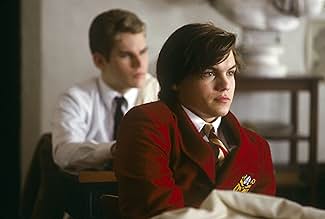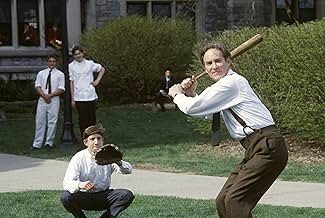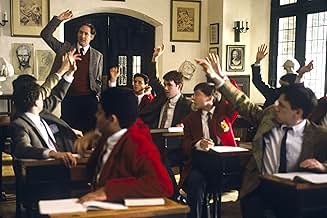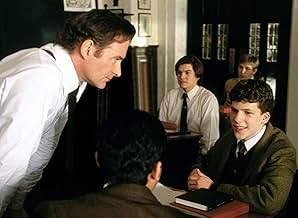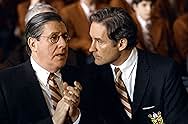IMDb रेटिंग
6.9/10
18 हज़ार
आपकी रेटिंग
अपनी भाषा में प्लॉट जोड़ेंAn idealistic prep school teacher attempts to redeem an incorrigible student.An idealistic prep school teacher attempts to redeem an incorrigible student.An idealistic prep school teacher attempts to redeem an incorrigible student.
- पुरस्कार
- 2 कुल नामांकन
Gabriel Millman
- Robert Brewster
- (as Gabe Millman)
फ़ीचर्ड समीक्षाएं
I say that this is a tough sell of a movie because it seems like most movies marketing of late have to have some catch,hook or twist about it to sell to audiences,something either sexy,violent or both. Movies that stress intellectual or moral higher pursuits are somewhat rare to come by and when they are,they either are heavy-handed(Dead Poets Society)or arcane,word-of-mouth projects(Kidco,Stand and Deliver).If they don't feature some level of arousing interest(two examples:Sirens or Kinsey,both films I greatly appreciated BTW),then they are probably going to fall under the wheels of Hollywood's promotional behemoth if they are produced for the large screen.
Such,I suspect,is the case with The Emperors Club, a Neil Tolin screenplay based on a Ethan Canin short story. The central figure is one William Hundert(Kevin KLine,perhaps never more dignified in role),a well-respected and generally popular teacher at a Catholic,boys-only academy,who teaches the classics(i.e.Roman and Greek history and culture). His long stay as an educator is put to the test(probably not the only time,but what has to be the most memorable) in the 1976-77 school year when an arrogant,selfish son of a congressman(Emile Hirsch,avec David Cassidy fro)enrolls in the school,for whom Hundert decides he's going to make a special effort to "mold" into a true student of enlightenment. His efforts then have effects on both his students and himself that stay with him long after.
Well-acted,well-scripted,thoughtful and gently guided by Michael Hoffman(who directed Kline in the pleasant Midsummer Night's Dream adaptation three years earlier),this film quietly came and went in the Autumn of 2002 and it seems like a shame,but not un-understandably so. This is a show with virtually no violence and very little(if any)sexual content and the majority of the cast are either rising young stars who haven't quite reached high acclaim yet or are older character actors,so one will enter this on virtually a blind-faith interest of the film's topic or(more likely)an appreciation for Mr.Kline. To be honest and tell on myself,when this film was out I passed it up and didn't really sit down to appreciate it until very recently,and that was a a free library rental! As is,free or not,this is clearly a unique and recommendable movie.
Such,I suspect,is the case with The Emperors Club, a Neil Tolin screenplay based on a Ethan Canin short story. The central figure is one William Hundert(Kevin KLine,perhaps never more dignified in role),a well-respected and generally popular teacher at a Catholic,boys-only academy,who teaches the classics(i.e.Roman and Greek history and culture). His long stay as an educator is put to the test(probably not the only time,but what has to be the most memorable) in the 1976-77 school year when an arrogant,selfish son of a congressman(Emile Hirsch,avec David Cassidy fro)enrolls in the school,for whom Hundert decides he's going to make a special effort to "mold" into a true student of enlightenment. His efforts then have effects on both his students and himself that stay with him long after.
Well-acted,well-scripted,thoughtful and gently guided by Michael Hoffman(who directed Kline in the pleasant Midsummer Night's Dream adaptation three years earlier),this film quietly came and went in the Autumn of 2002 and it seems like a shame,but not un-understandably so. This is a show with virtually no violence and very little(if any)sexual content and the majority of the cast are either rising young stars who haven't quite reached high acclaim yet or are older character actors,so one will enter this on virtually a blind-faith interest of the film's topic or(more likely)an appreciation for Mr.Kline. To be honest and tell on myself,when this film was out I passed it up and didn't really sit down to appreciate it until very recently,and that was a a free library rental! As is,free or not,this is clearly a unique and recommendable movie.
Klein was superb as the bookish teacher intent on molding boys' characters' as well as teaching them. When he went out of his way to aid a troubled student he wound up depriving another causing some concerns for his conscience. The boy he felt he should help was the son of a bigshot politico who had no clue as to the needs of his son. Too busy being a power broker this ass arrogantly claimed he would mold his son's character. How? He's seldom around and when he is there is no communication between himself and his offspring. Like so many fathers, I wonder why they even want children knowing there is no inclination to interact with them. Brings to mind the Harry Chapin song "Cat's in the Cradle" which speaks to many, many dads. The Emma Willard School provided a nice backdrop for a very good film. 4 stars.
I can see exactly why comparisons to Dead Poets' Society abound. Having attended boarding school and developed an irrational attachment to that film at the time, I have since discarded it like an overworn leisure suit, and tried to move on to more interesting fare. But honestly, this film made me think -- in all the ways that school should have, and the DPSociety didn't even try to.
Robin Williams has never starred in a thinking man's film, which is why, in the end, the comparison between the two movies doesn't hold up. To get The Emperor's Club, you have to actually grasp why someone might be inspired by history -- by a time when men could truly fail, or conquer, or establish a foothold in eternity. The fact that we know Socrates existed is astounding. It is luck. If James Carville goes down in history it will be an accident, if a likely one. The point of this film is that difference -- the difference between men whose character demands to be remembered, and men whose character demands to be forgotten. It is also the story of two systems of reward and recognition -- one that produced Plato and one that produced Jerry Springer. That is why we study history, as the movie says. To learn from and be inspired by the great leaders who came before us, and to overcome the moral mediocrity of the modern world.
But, as the film concludes, great men are no longer chosen to lead. The Emperor's Club, while cloaked in the guise of a charming elitist flick, is actually a tale of profound disappointment and disillusionment regarding human society. The few great men who are left exist in the shadows, while the ignorant grandstanders wield political power. We elect them; we are in their hands. And it is all because of a lack of awareness, a lack of knowledge, and a lack of history. People don't vote for principle -- they vote for rhetoric. And it shows.
I was not expecting too much from this movie, other than the always pleasurable experience of watching Kevin Kline. But, wrapped up in the sentimental moralizing, there was the story of a great man doing the only great thing left: trying to bring others out the darkness. His success or failure is as immaterial as the execution of Socrates -- it really is the thought that counts.
Robin Williams has never starred in a thinking man's film, which is why, in the end, the comparison between the two movies doesn't hold up. To get The Emperor's Club, you have to actually grasp why someone might be inspired by history -- by a time when men could truly fail, or conquer, or establish a foothold in eternity. The fact that we know Socrates existed is astounding. It is luck. If James Carville goes down in history it will be an accident, if a likely one. The point of this film is that difference -- the difference between men whose character demands to be remembered, and men whose character demands to be forgotten. It is also the story of two systems of reward and recognition -- one that produced Plato and one that produced Jerry Springer. That is why we study history, as the movie says. To learn from and be inspired by the great leaders who came before us, and to overcome the moral mediocrity of the modern world.
But, as the film concludes, great men are no longer chosen to lead. The Emperor's Club, while cloaked in the guise of a charming elitist flick, is actually a tale of profound disappointment and disillusionment regarding human society. The few great men who are left exist in the shadows, while the ignorant grandstanders wield political power. We elect them; we are in their hands. And it is all because of a lack of awareness, a lack of knowledge, and a lack of history. People don't vote for principle -- they vote for rhetoric. And it shows.
I was not expecting too much from this movie, other than the always pleasurable experience of watching Kevin Kline. But, wrapped up in the sentimental moralizing, there was the story of a great man doing the only great thing left: trying to bring others out the darkness. His success or failure is as immaterial as the execution of Socrates -- it really is the thought that counts.
The movie deals with a good and idealist teacher (Kevin Kline) of Roman classic history and his relationship to a roguish and rebel pupil (Emile Hirsch) in a high class school . The teacher tries to redeem him but the continuous challenge makes that the incorrigible student (besides , being senator's son : Harris Yulin) results to be more and less difficult or impossible to dominate him . Meanwhile , the starring falls in love with an attractive , though married teacher (Embeth Davidtz) , and has problems with the college director (Edward Herrmann).
The picture is based on Ethan Canin's book titled ¨ Palace thief ¨. The story is narrated with sensitivity and intelligence and here are treated ethic and moral issues developed in great sense of ductility and fairness . As the teacher will have to face on the complex truth that can be manipulated or phony . The motion picture takes part of the School Sub-genre , whose maxim representation turns out to be the prestigious ¨Dead poet society¨ by Peter Weir . The film is displayed throughout among past and present time where we find the same characters though twenty five years later , except Kevin Kline the actors are different . The actors' interpretation is excellent , such as Kevin Kline as a mature and upright teacher who hands perfectly the role , Emile Hirsch as the rascal young is top-notch as well as Embeth Davidtz who is wonderful and enjoyable . James Newton Howard's musical score is sensitive and touching . The story was well directed by Michael Hoffman . Rating : Above average , well worth watching.
The picture is based on Ethan Canin's book titled ¨ Palace thief ¨. The story is narrated with sensitivity and intelligence and here are treated ethic and moral issues developed in great sense of ductility and fairness . As the teacher will have to face on the complex truth that can be manipulated or phony . The motion picture takes part of the School Sub-genre , whose maxim representation turns out to be the prestigious ¨Dead poet society¨ by Peter Weir . The film is displayed throughout among past and present time where we find the same characters though twenty five years later , except Kevin Kline the actors are different . The actors' interpretation is excellent , such as Kevin Kline as a mature and upright teacher who hands perfectly the role , Emile Hirsch as the rascal young is top-notch as well as Embeth Davidtz who is wonderful and enjoyable . James Newton Howard's musical score is sensitive and touching . The story was well directed by Michael Hoffman . Rating : Above average , well worth watching.
"The Emperor's Club" is a lot different than you would think. It does run a bit on cheesy sentimentality, but the ending is more than surprising considering the type of film this is.
It is a period-piece about a teacher (Kevin Kline) at a prestigious school for boys, and how he tries to "mould" a strong-willed fifteen-year-old boy. And if you want a hint at the surprise ending, don't read any farther, because I cannot control telling you that in the end he does not change the boy. Which is what truly amazed me. Most of the time in films like these, we see the free-spirited kid become proper and respectful. But not so here. This tale doesn't have a perfect teacher turning a bad boy into a perfect boy. It has a flawed teacher wasting years on one student. Years later at a party, he tells the boy, Sedgewick (now an adult), "as a teacher I have failed you." And that's what is so very different about this movie. It isn't as heavy on the drama as I thought it would be, and comes across a bit cheesy and fluffy at times, but the ending is more surprising than "The Sixth Sense" ever will be. It doesn't rely on tried-and-used methods, but goes for a new route. And just when you think that it's as depressing as it can get, the very, very end gives your spirit a bit of a boost.
Kline realizes that in those years that Sedgewick attended his class, he ignored the other students who were trying - and actually cared - about what they were doing. It kind of sheds a new light on the films where a teacher devotes time to one student in particular, because after seeing this film, I bet ten bucks next time you watch a film of the same roots you'll realize that the teacher is ignoring the other students. And "The Emperor's Club" exposes this. Kline's character is flawed, and while he is a good teacher, he makes mistakes, such as spending so much time on Sedgewick and bumping a smarter kid off of the school toga challenge, just so he can put Sedgewick in it (the challenge).
Kevin Kline isn't Otto here. "A$$hole!" is not a motto here. We've got Kline giving a thoroughly convincing performance as a 1970s all-boys school teacher. Kline's makeup at the end of the film is quite good as well, as opposed to something like "The Dish" where Sam Neil's makeup looks like it's about to fall off his face and his wig is about to be plucked off by a gust of wind.
I also liked the student actors in this film. The actors they got to play the various students were pretty good; in fact, many of them were very good. I hope their careers continue after this film, and as hateable as Sedgewick was in this film, the kid who played him was pretty convincing. You always know this when you start to like or dislike a character, much less hate or love them.
At the end of the film, I like the subtle differences in years. In the 1970s, a group of boys travel across a lake to check out the all-girls school, where nuns shoo them away. 28 years later, as Kline's character walks towards his schoolroom, we see boys and girls walking around. In 28 years society has changed, and it's funny to wonder if that group of boys from the 1970s ever thought that in 28 years, what they were paddling across a lake for would be right next to them.
It is a period-piece about a teacher (Kevin Kline) at a prestigious school for boys, and how he tries to "mould" a strong-willed fifteen-year-old boy. And if you want a hint at the surprise ending, don't read any farther, because I cannot control telling you that in the end he does not change the boy. Which is what truly amazed me. Most of the time in films like these, we see the free-spirited kid become proper and respectful. But not so here. This tale doesn't have a perfect teacher turning a bad boy into a perfect boy. It has a flawed teacher wasting years on one student. Years later at a party, he tells the boy, Sedgewick (now an adult), "as a teacher I have failed you." And that's what is so very different about this movie. It isn't as heavy on the drama as I thought it would be, and comes across a bit cheesy and fluffy at times, but the ending is more surprising than "The Sixth Sense" ever will be. It doesn't rely on tried-and-used methods, but goes for a new route. And just when you think that it's as depressing as it can get, the very, very end gives your spirit a bit of a boost.
Kline realizes that in those years that Sedgewick attended his class, he ignored the other students who were trying - and actually cared - about what they were doing. It kind of sheds a new light on the films where a teacher devotes time to one student in particular, because after seeing this film, I bet ten bucks next time you watch a film of the same roots you'll realize that the teacher is ignoring the other students. And "The Emperor's Club" exposes this. Kline's character is flawed, and while he is a good teacher, he makes mistakes, such as spending so much time on Sedgewick and bumping a smarter kid off of the school toga challenge, just so he can put Sedgewick in it (the challenge).
Kevin Kline isn't Otto here. "A$$hole!" is not a motto here. We've got Kline giving a thoroughly convincing performance as a 1970s all-boys school teacher. Kline's makeup at the end of the film is quite good as well, as opposed to something like "The Dish" where Sam Neil's makeup looks like it's about to fall off his face and his wig is about to be plucked off by a gust of wind.
I also liked the student actors in this film. The actors they got to play the various students were pretty good; in fact, many of them were very good. I hope their careers continue after this film, and as hateable as Sedgewick was in this film, the kid who played him was pretty convincing. You always know this when you start to like or dislike a character, much less hate or love them.
At the end of the film, I like the subtle differences in years. In the 1970s, a group of boys travel across a lake to check out the all-girls school, where nuns shoo them away. 28 years later, as Kline's character walks towards his schoolroom, we see boys and girls walking around. In 28 years society has changed, and it's funny to wonder if that group of boys from the 1970s ever thought that in 28 years, what they were paddling across a lake for would be right next to them.
क्या आपको पता है
- ट्रिवियाWhen filming the movie, the location (Emma Willard school in Troy, NY) was still operating as a girl's school. Emile Hirsch reportedly complained about the students, claiming that they were pestering him for his phone number. He also (reportedly) said some unsavory things about the school in general. When the students heard about this, they demanded an apology from Hirsch, which he delivered in front of the entire student body. At the school viewing, whenever he appeared on screen, the girls booed loudly and stories about him still circulate through the student body.
- गूफ़When the girls are removing their shirts to go skinny-dipping, a Victoria's Secret Body by Victoria bra is revealed. That bra is from the time the film was made, not the mid-1970s when the scene takes place.
- भाव
William Hundert: As a great Aristophanes once wrote-- roughly translated-- "Youth ages, immaturity is outgrown. Ignorance can be educated and drunkenness sobered, but stupid... lasts forever."
- साउंडट्रैकFunk 49
Written by Jim Fox, Joe Walsh, and Dale Peters
Performed by James Gang
Courtesy of MCA Records
Under license from Universal Music Enterprises
टॉप पसंद
रेटिंग देने के लिए साइन-इन करें और वैयक्तिकृत सुझावों के लिए वॉचलिस्ट करें
- How long is The Emperor's Club?Alexa द्वारा संचालित
विवरण
- रिलीज़ की तारीख़
- कंट्री ऑफ़ ओरिजिन
- भाषा
- इस रूप में भी जाना जाता है
- The Palace Thief
- फ़िल्माने की जगहें
- उत्पादन कंपनियां
- IMDbPro पर और कंपनी क्रेडिट देखें
बॉक्स ऑफ़िस
- बजट
- $1,25,00,000(अनुमानित)
- US और कनाडा में सकल
- $1,41,18,751
- US और कनाडा में पहले सप्ताह में कुल कमाई
- $38,46,780
- 24 नव॰ 2002
- दुनिया भर में सकल
- $1,63,18,449
- चलने की अवधि
- 1 घं 49 मि(109 min)
- रंग
- ध्वनि मिश्रण
- पक्ष अनुपात
- 1.85 : 1
इस पेज में योगदान दें
किसी बदलाव का सुझाव दें या अनुपलब्ध कॉन्टेंट जोड़ें



